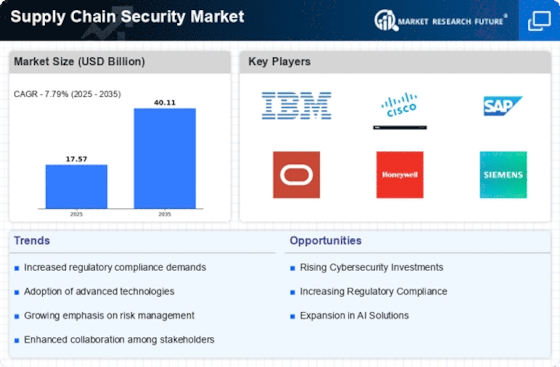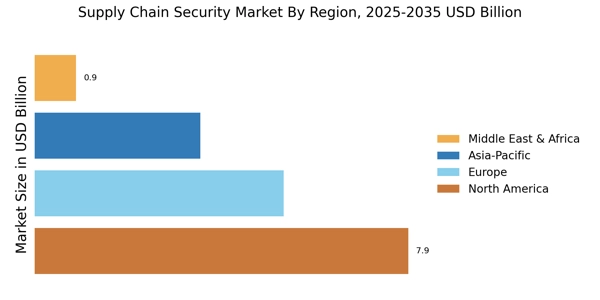Rising Cybersecurity Threats
The increasing frequency and sophistication of cyberattacks has emerged as a critical driver for the Supply Chain Security Market. Organizations are compelled to invest in advanced security measures to protect sensitive data and maintain operational integrity. According to recent estimates, cybercrime is projected to cost businesses trillions annually, underscoring the urgency for robust cybersecurity frameworks. As supply chains become more interconnected, vulnerabilities multiply, making it imperative for companies to adopt comprehensive security solutions. This trend is likely to propel the demand for innovative technologies and services within the Supply Chain Security Market, as firms seek to mitigate risks associated with cyber threats.
Evolving Consumer Expectations
Consumer awareness regarding product safety and ethical sourcing is significantly influencing the Supply Chain Security Market. As customers increasingly demand transparency and accountability, businesses are pressured to ensure that their supply chains adhere to stringent security standards. This shift in consumer behavior is prompting organizations to implement traceability solutions and enhance their security protocols. Market data indicates that companies prioritizing supply chain security are likely to experience improved brand loyalty and customer trust. Consequently, the Supply Chain Security Market is witnessing a surge in investments aimed at meeting these evolving consumer expectations, thereby fostering a more secure and responsible supply chain.
Regulatory Pressures and Compliance
The landscape of regulatory compliance is continuously evolving, with governments and international bodies imposing stricter guidelines on supply chain security. This trend is a significant driver for the Supply Chain Security Market, as organizations must navigate complex legal frameworks to avoid penalties and reputational damage. Compliance with regulations such as the GDPR and various industry-specific standards necessitates the adoption of advanced security measures. Market analysis suggests that companies investing in compliance-related technologies are better positioned to mitigate risks and enhance their operational resilience. As regulatory scrutiny intensifies, the Supply Chain Security Market is expected to expand, driven by the need for organizations to align with these requirements.
Increased Globalization of Supply Chains
The globalization of supply chains has introduced a myriad of complexities, making supply chain security a paramount concern. As companies expand their operations across borders, they encounter diverse regulatory environments and varying security standards. This complexity drives the demand for comprehensive security solutions within the Supply Chain Security Market. Market trends indicate that organizations are increasingly seeking integrated security frameworks that can address the unique challenges posed by global operations. The need for effective risk management strategies is likely to propel growth in the Supply Chain Security Market, as businesses strive to safeguard their assets and maintain operational continuity.
Technological Advancements in Security Solutions
The rapid advancement of technology is reshaping the Supply Chain Security Market, offering innovative solutions to address emerging threats. Technologies such as blockchain, artificial intelligence, and the Internet of Things are being integrated into supply chain security frameworks, enhancing visibility and risk management capabilities. Market data reveals that investments in these technologies are expected to grow significantly, as organizations recognize their potential to streamline operations and improve security. The adoption of such advanced solutions is likely to drive the evolution of the Supply Chain Security Market, as companies seek to leverage technology to bolster their security posture and ensure the integrity of their supply chains.

















